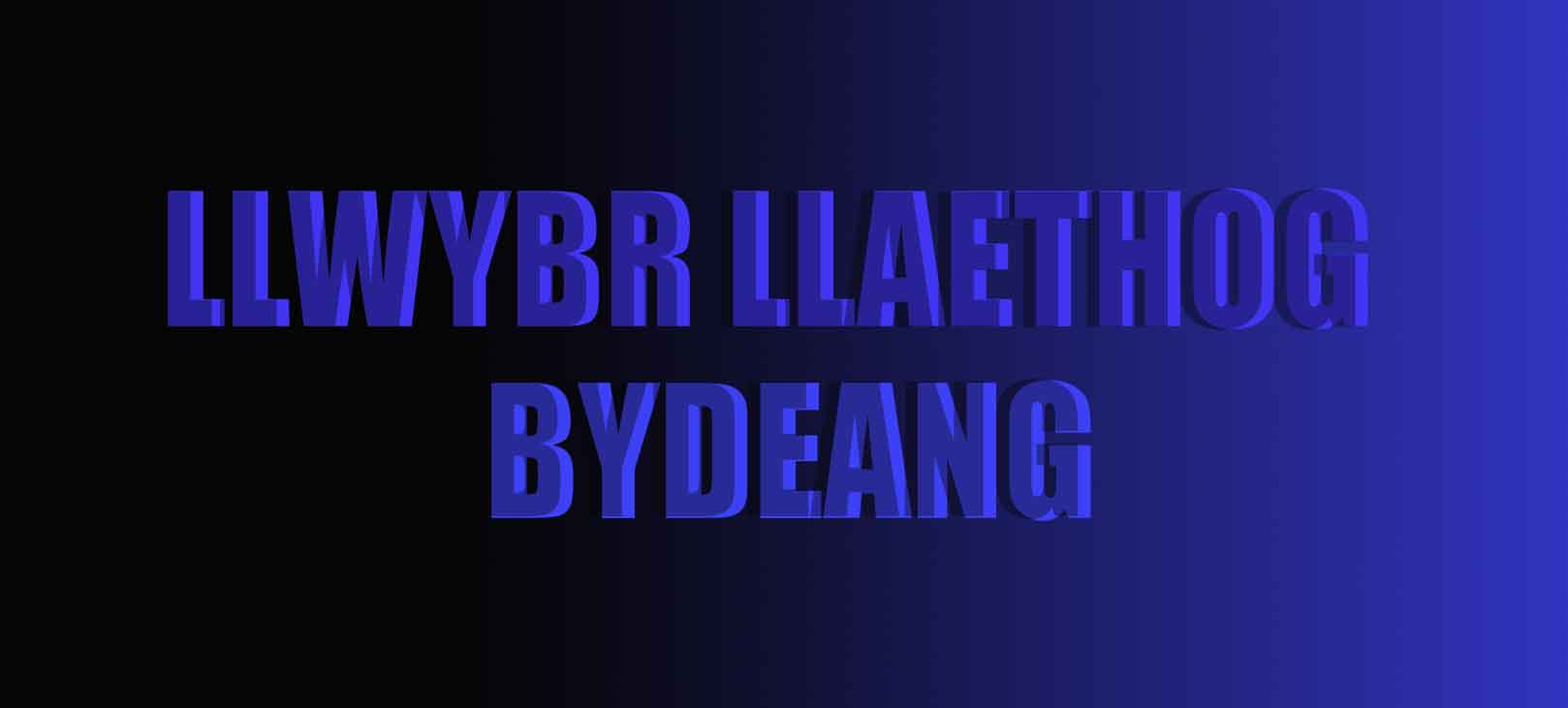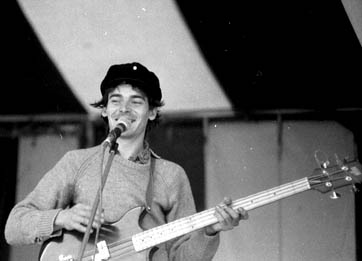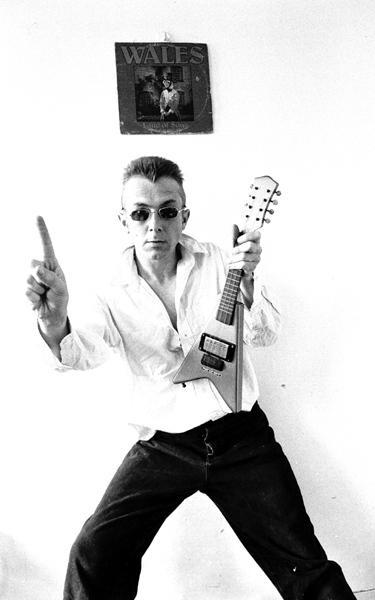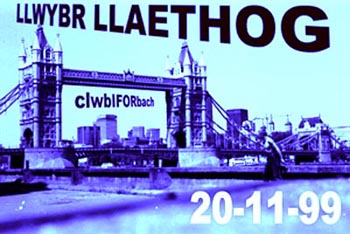

'Trenchtown, Chicago, Detroit, Manchester and Blaenau Ffestiniog'

1984 was a time when the Conservative government under Margaret Thatcher called in the debt on the excesses of the sixties and open season was declared on so called 'permissive' parents, teachers, artists and worker's leaders. At the time it felt as if the government was waging war on its own people. Systematic marginalization of those who refused to embrace greed, patriotism and individualism coupled with the ever present threat of nuclear war made the air thick with the realization that if ever a whole generation was going to be flushed down a toilet then, Bingo! this was going to be the one.
It was in this decade that the renaissance of a largely redundant culture began.
The Welsh language had proudly boasted of being Europe's oldest language as well
as being 'iaith y nefoedd'( the language of heaven) but by the early eighties
these were empty boasts as the language had consistently failed to embrace modernity
in literature, film, theatre, television and music. The only signs of life could
be found in the radical protest movement concerned with 'tynged yr iaith' (the
fate of the language) and represented by the non violent political pressure group
Cymdeithas Yr Iaith Gymraeg (Welsh Language Society) and in the wide ranging activities
of a counter culture embodied within the 'Sin Roc Gymraeg'(welsh rock scene).
The suitably named Anhrefn Records (Disorder) label duly arrived in 1984. At last welsh culture was wrested out of the grip of academics and isolationists and put in the more than capable hands of unemployed youths from all over Wales. Musicians and artists who had retained their energy, imagination and courage by omitting to follow the university/college route set about living and creating a new kind of culture in their own language. This new culture was more outward looking and had concerns that embraced more than just the political fate of the language . Crucially bands started to share stages with english language bands and also toured the rest of Europe. By the mid eighties great records by new bands such as Y Cyrff, Fflaps, Elfyn Presli, Anhrefn, Tynal Tywyll, Traddodiad Ofnus, Datblygu and Llwybr Llaethog were appearing with the inevitable result that the language found itself being dragged out of the rarified air of preservationists and put firmly in the 'here and now'.
John Peel championed the Anhrefn label on Radio 1 and a new musical freedom beckoned as bands started to receive encouragement, recognition and inspiration directly from outside Wales.
Of all the Anhrefn bands it was Llwybr Llaethog who were the most astonishing.
Their first two singles Dull Di Drais and Tour De France appeared on the label
in 1986 and 1987. Six tracks that inserted rap, hip hop, dub reggae, sampling
and and cut'n'paste directly into a thousand year old culture.
 |
Founding members John Griffiths and Kevs Ford had spent the seventies growing up in the decaying industrial surroundings of Blaenau Ffestiniog. (A once thriving North Walian slate mining town, somewhat cruelly judged to resemble 'a rehearsal for armaggeddon' by one national newspaper). Here within a claustrophobic but natural Welsh language community they were galvanised by the otherworldy mid seventies dub reggae of Keith Hudson and the DIY freedom of Punk. After several false starts with bands such as Taff and The Managing Directors the turning point came in 1984.
Whilst on holiday in the USA drummer, guitarist and nascent rapper John Griffiths witnessed the future first hand at the The Roxy nightclub in New York. Inside an appropriated ice rink he witnessed DJ Red Alert holding court with his decks and there in the middle of the breakdancing hordes was born the idea of marrying hip hop with the Welsh language.
DYDDIAU BRAF(Rap Cymraeg)/(LOVELY DAYS (Welsh Rap)) was the result. Initial reactions to this jarring political/comedy cut up with its attended filthy lyrics was incredulity, followed by laughter, followed by total conversion. It eventually appeared in 1986 on a 7" single with three other equally striking tracks.
DULL DI DRAIS(NON VIOLENT METHOD) sampled Ffred Francis, an imprisoned political language protestor, and instantly recast him as a Malcolm X type figure through a Keith Le Blanc style joining of heavy dub beats with scratched rhetoric; The anti Thatcher rap tune RHWYBETH BACH YN POENI PAWB(THERE'S ALWAYS SOMETHING BOTHERING SOMEONE) highlighted the senseless deaths of young soldiers in the war for the Malvinas.
 |
John Griffiths claimed that '..in 1984 when we started there was nothing even
vaguely electronic ...we had the first rap in Welsh , I'm sure somebody would have
done it sooner or later but it was just speeding up the process.. I think it's
fair to say that we brought the sampling technique into the music scene in Wales
in the mid 80's'.
The music press attention outside Wales ensured a quick follow up and TOUR DE FRANCE / YO! appeared. TOUR DE FRANCE was a rough sounding explosion of beats, guitars and manic rapping, the vinyl barely managed to contain the energy of the track.It was a celebratory tune recorded in honour of Irish cyclist Steven Roche's recent sporting achievement. The rap was hilarious with its taunts (where is Eddie Merx now ?) and love for Roche ('the Tour De france been won by a Celt, Down the Champs Elysee he's going full pelt') and the whole thing even more breathtaking once you know that it was drunkenly recorded in a kitchen on a four track cassette machine.
At the time the band were perceived as not coming from Wales. Based in a Peckham council squat in the heart of London their records felt as though they were being beamed into Wales, (appropriately their first television appearance on Welsh language television saw their interview being allegedly relayed from their studio in outer space).They also had an unique attitude towards the vexed question of the appropriateness of singing and rapping in the Welsh language, as John puts it ... ' the language has been systematically put down over the last few hundred years, so singing in welsh is a political statement in itself, but it's also the language I grew up with anyway and personally I believe that any language must adapt to stay healthy, and must be street usuable to live, therefore I am also a keen advocate of using slang Welsh..'
Forays back into Wales to record and play live saw the release of debut album DA! on the Side Effects label and a tour with TRADDODIAD OFNUS(Scared Tradition) - a welsh band that was based in Brighton !. These were another Welsh band that was filtering the new dance culture with the welsh language and unbelievably featured one of the stars of the popular soap opera EASTENDERS in it's line-up ( did I say these were strange days ). Live LLWYBR LLAETHOG mixed backing tracks with live playing and were one of the originators of the by now ubiquitous performance style known as ' looking like two men frying burgers', as they mangled their sound through an on-stage bright pink mixing desk with stuck on sampler, horns and decks.
Journalists enamoured by the new emerging dance culture saw in Llwybr Llaethog that the 'beat was travelling'(The Independent) and that ' a universal language is being born from the digitally sampled alchemical marriage, the signatures of several dance styles are scribbled and erased , musical directions signposted and simultaneously misled. The vocals being welsh become another ingredient in the overall pattern' (The Catalogue).
Sessions followed for the John Peel show, they shared stages with the Cookie Crew and Three Kings and featured regularily on the new television shows that had sprung up in Wales in response to the excitement caused by the Anhrefn bands. As the eighties drew to a close the band released their finest album BE? (What?) on the London based label Concrete Productions. Instantly acclaimed for its originality and cutting edge sound it would be one of the pioneering British albums directly inspired by the acid house and emerging warehouse party culture. It was also the first Welsh record that achieved anything resembling world wide distribution .The Melody Maker magazine saw them as 'dosed up welsh boys, well into mischief with industrial housey sampling scratchy stuff with dancey beats and bouts of that dub thang', with one journalist going so far as to say ' if dance culture is as open as it thinks it is, then this would be number one'.(Discotext).
 |
Political dissent was cut into the grooves of the album with the elegaic BYD MOR
WAHANOL (WORLD SO DIFFERENT)summing up a vivid picture of the hopeless existence
millions of people were enduring on the dole.Their critical standing was further
enhanced with the release of the club friendly PAM?(WHY?) 12" and the Dub collection
MEWN DUB(IN DUB) the band recorded for influential New York record label ROIR.
Soon rave culture was taking over the whole country and gigs for the band in Wales
became DJ led events in huge barns and tents in front of hundreds of ecstatic
teenagers. Bassist Ben Bentham noted at the time that 'lack of worldwide acclaim
and failure to amass any kind of vast fortune comes as some relief as he wouldn't
have wanted success and money to go to his head'
The collaboration album LL.LL Vs T.G. M.C. D.R.E. released on Ankst Records in 1992 brought the LL-LL live sound together with the inspirational lyrics and voice of DATBLYGU frontman David R.Edwards (The closest Wales has to a Burroughs, Lennon or Warhol figure). GIMI GIMI was probably the grittiest, dirtiest and saddest track yet released in Welsh. Further collaborations included a remixing stint with the then welsh teen sensations BEGANIFS( who later became BIG LEAVES) and a re working of the Gil Scott Heron tune The REVOLUTION WILL NOT BE TELEVISED with poet IFOR AP GLYN. This all out assault on the welsh establishment can't have been heard by many people as the poet IFOR AP GLYN was later crowned Wales's premier poet by the very establishment he had so brilliantly nailed to the cross on this track.
Ankst records releasing their third album MAD! in 1996. Less political than the previous albums this collection extended the bands increasingly international outlook with vocals in English, Gaelic and Mandingo as well as Welsh , and their follow up single MERA DESH was a Can-tastic mix of Punjabi and Scots Gaelic.This constant creativity in Wales by an ever growing number of recording bands centred around the welsh language started to create a momentum all of its own. In the mid nineties the welsh scene went overground with a number of the successful Welsh language musicians creating intense interest in the British music scene in bands such as Super Furry Animals, Catatonia and Gorky's Zygotic Mynci. Typically these musicians were roundly criticized inside Wales for singing in English as well as Welsh . But soon the critics were claiming these bands as their own and the ridiculously patronising COOL CYMRU scene was created.
Most talented musicians kept well clear of anything to do with this nonsense and the coupling of Cool Cymru with the emerging new consensus politik in the welsh assembly in 1999 was a truly unpleasant sight.
Things had definitely changed. The language protest movement had become a victim of it's own success and questions about the survival of the language became based on economic imperatives rather than based on any consideration of cultural identity. This led to a disintegration of the music scene based around local promoters who promoted local talent hand in hand with the political fight for the future of the language.
Within Wales the re-establishment of a safe and comfortable music scene was also well under way as the creativity of the last fifteen years of underground Welsh culture was swept aside by the controllers at the BBC, HTV and S4C.
Just as politics had changed, so inevitably had the music scene. Innovations soon became the norm as the pioneering sounds and performances of bands like LLWYBR LLAETHOG were quickly replaced by 'some bloke playing a record' as the new dance music orthodoxy took over everything. Even though they did stints supporting the Super Furry Animals and remixing tracks for them the LLWYBR LLAETHOG remained resolutely on the margins.
The most recent track DRILACILA has future echoes of the emerging digital hardcore sound as well as the obvious acid house and dub legacy and promises a further twist in the band's musical evolution. Undeniably influential LLWYBR LLAETHOG inspired others to think for themselves and create their own music and the promise of new material in the year 2000 from John Griffiths and Kevs Ford is very welcome news indeed.
